
Nutrition & Metabolism
Scope & Guideline
Unlocking the Secrets of Metabolism and Nutrition
Introduction
Aims and Scopes
- Nutritional Epidemiology:
The journal emphasizes studies that investigate the relationships between dietary patterns, nutrient intake, and health outcomes, particularly focusing on the prevalence of malnutrition and chronic diseases. - Metabolic Disorders:
Research on metabolic disorders such as obesity, diabetes, and metabolic syndrome is a core area, exploring the biochemical mechanisms and dietary interventions that can mitigate these conditions. - Public Health Nutrition:
The journal aims to inform public health policies through research on nutrition interventions, food security, and the impact of socio-economic factors on dietary practices. - Functional Foods and Nutraceuticals:
There is a consistent focus on the health benefits of functional foods, dietary supplements, and their roles in disease prevention and health promotion. - Child and Maternal Nutrition:
Research on the nutritional needs and interventions for children and pregnant women is highlighted, addressing issues such as breastfeeding, complementary feeding, and micronutrient deficiencies. - Cultural and Social Aspects of Nutrition:
The journal explores how cultural practices and social determinants affect dietary choices and nutrition-related health outcomes in various populations. - Nutritional Biochemistry:
Studies focusing on the biochemical aspects of nutrition, including metabolism of nutrients and their physiological effects, form an essential part of the journal's scope.
Trending and Emerging
- Digital Health and Nutrition Apps:
There is an increasing interest in the role of digital health technologies, including apps for dietary tracking and health monitoring, reflecting the growing intersection of technology and nutrition. - Personalized Nutrition:
Research on personalized nutrition, which tailors dietary recommendations based on individual genetic, metabolic, and lifestyle factors, is gaining momentum. - Sustainable Diets:
Emerging themes focusing on sustainable diets and their environmental impact are becoming more prevalent, emphasizing the need for nutrition to align with ecological considerations. - Gut Microbiome Research:
The exploration of the gut microbiome and its relationship to overall health and disease, particularly in relation to diet, is rapidly expanding. - Impact of COVID-19 on Nutrition:
Research on how the COVID-19 pandemic has affected dietary habits, food security, and health outcomes is increasingly relevant and is being actively published.
Declining or Waning
- Traditional Dietary Patterns:
Research on traditional dietary patterns has decreased as there is a growing focus on modern dietary habits and the impact of processed foods on health. - Food Fortification:
The emphasis on food fortification strategies has waned, likely due to changing regulatory environments and increasing attention on whole food solutions. - Nutritional Education in Schools:
Although still important, the frequency of studies focusing on school-based nutritional education interventions has declined, as the focus shifts towards community-based and family-centered approaches. - Food Safety Regulations:
Research specifically targeting food safety regulations has become less prevalent, potentially overshadowed by broader public health initiatives and food security concerns. - Nutritional Supplements in Healthy Populations:
Studies assessing the effects of nutritional supplements in healthy individuals have decreased, with more focus now on vulnerable populations and clinical settings.
Similar Journals

EUROPEAN JOURNAL OF NUTRITION
Shaping the Future of Health through NutritionEuropean Journal of Nutrition, published by Springer Heidelberg, is a premier outlet for groundbreaking research in the field of nutrition and dietetics. Established in 1996 and set to continue its impactful legacy until at least 2024, this journal enjoys an impressive recognition, holding a Q1 category rank in both Medicine (miscellaneous) and Nutrition and Dietetics, with notable Scopus rankings that place it in the top 10% of its field. The journal facilitates open access options, enhancing the dissemination of knowledge across the globe. It serves as a vital platform for researchers, healthcare professionals, and students, promoting the exchange of innovative ideas and advancements in nutritional science that aim to improve health outcomes worldwide. With a commitment to quality and relevance, the European Journal of Nutrition continues to shape the future of nutrition research and practice.

BMJ Nutrition, Prevention & Health
Fostering collaboration in nutrition science and health promotion.BMJ Nutrition, Prevention & Health is an influential open-access journal published by the esteemed BMJ Publishing Group based in the United Kingdom. Since its inception in 2019, this journal has quickly established itself as a vital resource for researchers, medical professionals, and students interested in the evolving fields of nutrition, health promotion, and disease prevention. With an impressive impact and notable rankings within its category—Q1 in Health (Social Science), Medicine (Miscellaneous), and Nutrition and Dietetics—it contributes significant insights into dietary practices and public health. The journal's commitment to accessible research is highlighted by its open-access model, allowing global dissemination of knowledge and encouraging collaboration across disciplines. As it continues to converge its findings into 2024, BMJ Nutrition, Prevention & Health remains a cornerstone for advancing health literacy and evidence-based practices, driving forward the dialogue in nutrition science and public health initiatives.
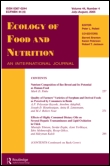
ECOLOGY OF FOOD AND NUTRITION
Bridging Food Systems and Ecological InsightsECOLOGY OF FOOD AND NUTRITION is a premier academic journal published by Taylor & Francis Inc, focusing on the intricate relationships between food systems, ecology, and nutrition. With an ISSN of 0367-0244 and an E-ISSN of 1543-5237, this journal has been a vital platform for scholarly communication since its inception in 1971, and it will continue to disseminate impactful research until at least 2024. Operating from the United Kingdom, it holds a distinguished position with a Q2 ranking in both Ecology and Food Science, along with a Q3 ranking in Medicine (miscellaneous) for 2023. Notably, its Scopus rankings reflect its influence in the fields of Environmental Science and Medicine, making it a crucial resource for researchers and professionals seeking to explore the interactions between ecological systems and nutritional practices. While the journal is not open access, it provides vital insights and findings that contribute to advancements in sustainability, health, and food security. As interdisciplinary research continues to grow, ECOLOGY OF FOOD AND NUTRITION remains essential for anyone interested in the future of food and environmental health.

Jurnal Gizi dan Pangan
Empowering Food Science for a Sustainable FutureJurnal Gizi dan Pangan, published by the esteemed Bogor Agricultural University under the Department of Community Nutrition, is a pivotal platform for advancing knowledge in the realms of nutrition and food science. Since its inception in 2006, this Open Access journal (ISSN: 1978-1059; E-ISSN: 2407-0920) has been committed to disseminating high-quality research that addresses critical issues related to community nutrition and public health. Located in Bogor, Indonesia, it serves as a regional beacon for researchers, professionals, and students seeking to improve dietary practices and food security outcomes. As it aims to foster interdisciplinary collaboration and innovation, Jurnal Gizi dan Pangan is essential for those dedicated to the enhancement of nutritional science and its application in diverse populations.
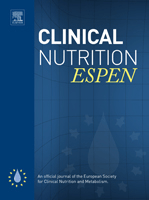
Clinical Nutrition ESPEN
Exploring the Synergy of Nutrition and Metabolic HealthClinical Nutrition ESPEN is a distinguished journal published by ELSEVIER, focusing on the critical intersection of clinical nutrition and metabolic health. With an ISSN of 2405-4577, this journal serves as an essential resource for researchers, practitioners, and students in the fields of Endocrinology, Diabetes and Metabolism as well as Nutrition and Dietetics. Operating out of the United Kingdom, it has garnered a respectable Q2 ranking in both categories for 2023, indicating its significant impact and relevance in the field. Although it does not follow an open access model, the journal offers valuable insights into contemporary nutrition research, clinical practices, and dietary interventions, making it a vital tool for those committed to improving patient outcomes through nutritional science. In its evolving journey, covering work from 2015 to 2024, Clinical Nutrition ESPEN continues to shape the dialogue in nutrition research, addressing pressing health challenges and fostering innovation in dietetic practice.
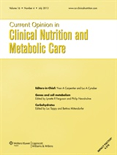
CURRENT OPINION IN CLINICAL NUTRITION AND METABOLIC CARE
Navigating the Future of Clinical NutritionCURRENT OPINION IN CLINICAL NUTRITION AND METABOLIC CARE, published by LIPPINCOTT WILLIAMS & WILKINS, is an esteemed journal in the fields of clinical nutrition and metabolic health. With an ISSN of 1363-1950 and an E-ISSN of 1473-6519, this journal provides a valuable platform for the dissemination of high-quality research focusing on the latest trends and innovations in nutrition science and metabolic care. Ranking in the second quartile (Q2) within both the Medicine (miscellaneous) and Nutrition and Dietetics categories, the journal's impact reflects its influential role in shaping clinical practices and nutritional strategies. Covering pertinent advances from its inception in 1998 to its ongoing publications through 2024, it serves as an essential resource for healthcare professionals, researchers, and students seeking to understand the complex interplay of nutrition and health. Though it does not offer open access, its rigorous peer-review process ensures the high standard of the research published, making it an important reference point for discussions around evidence-based nutrition and metabolism.

Nutrition Journal
Transforming Research into Impactful Dietary Solutions.Nutrition Journal is a prestigious open-access publication from BMC, dedicated to advancing the field of nutrition and dietetics since its inception in 2002. With an impressive impact factor and a notable Scopus ranking, it ranks in the top quartile (Q1) in both Medicine (miscellaneous) and Nutrition and Dietetics, highlighting its significant contribution to health sciences. Based in the United Kingdom, the journal covers a broad spectrum of topics, making it an essential resource for researchers, healthcare professionals, and students interested in nutrition's role in health and disease prevention. The journal not only facilitates the dissemination of groundbreaking research but also prioritizes accessibility, allowing global audiences to engage with vital findings that shape dietary practices and public health policies. With a commitment to interdisciplinary collaboration, Nutrition Journal fosters an environment where innovative ideas and evidence-based solutions can flourish, making it a cornerstone reference in the field.
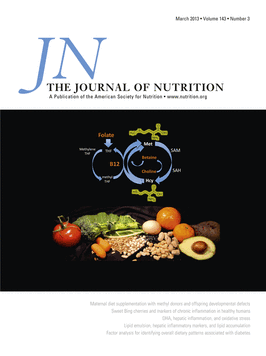
JOURNAL OF NUTRITION
Unveiling the science behind what we eat.JOURNAL OF NUTRITION is a premier academic journal published by Elsevier Science Inc, dedicated to advancing the understanding of nutritional science and its impact on health. With a long-standing tradition since its inception in 1945, the journal provides a vital platform for high-quality research, featuring articles that cover a wide range of topics within the fields of Medicine and Nutrition and Dietetics. Recognized for its significant contributions, the journal holds an impressive impact factor, with a Q1 rank in both Medicine (miscellaneous) and Nutrition and Dietetics as of 2023, positioning it among the top tier of scholarly publications in these disciplines. The Scopus Rankings further validate its status, boasting a rank of #57/398 in Medicine and #30/140 in Nutrition, indicating its influential presence in the research community. Although it operates under a traditional access model, the journal actively engages with a global audience of researchers, professionals, and students by disseminating cutting-edge insights designed to inform nutrition policy and practice. By focusing on current trends, innovative methodologies, and evidence-based nutrition strategies, the JOURNAL OF NUTRITION continues to be an essential resource for those committed to enhancing health through nutrition.
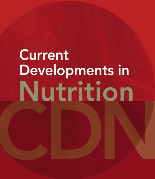
Current Developments in Nutrition
Shaping healthier communities through innovative insights.Current Developments in Nutrition is a prominent open-access journal published by Elsevier Science Inc, specializing in the field of nutritional science. With an ISSN of 2475-2991, this journal has been contributing valuable insights to the scientific community since its inception in 2017, and continues to shape research narratives through 2024. It boasts impressive rankings in the 2023 quartiles, achieving Q1 in Food Science and Q2 in both Medicine (miscellaneous) and Nutrition and Dietetics, highlighting its critical role in advancing knowledge in these areas. The journal is particularly noted for its commitment to disseminating cutting-edge research that influences dietary practices and public health policies. With Scopus rankings placing it in the 75th percentile in Medicine and the 68th percentile in Food Science, Current Developments in Nutrition serves as an essential resource for researchers, healthcare professionals, and students who seek to stay at the forefront of nutrition science. Its open-access model ensures that groundbreaking studies are available to a global audience, further enhancing collaboration and innovation across disciplines.
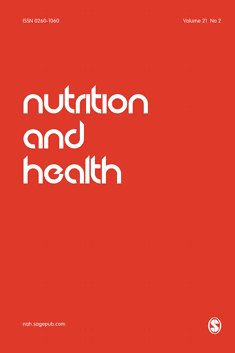
NUTRITION AND HEALTH
Connecting Nutrition and Health for a Brighter FutureNUTRITION AND HEALTH is a distinguished academic journal dedicated to advancing our understanding of the complex interplay between nutrition and health outcomes. Published by SAGE Publications Inc in the United Kingdom, this journal aims to provide a platform for rigorous research, innovative methodologies, and insightful reviews in the fields of nutrition and dietetics. With its ISSN 0260-1060 and E-ISSN 2047-945X, NUTRITION AND HEALTH has established itself as a critical resource for researchers and practitioners alike, boasting a 2023 Scopus ranking that places it in the Q3 quartile across multiple relevant categories, including Medicine and Nutrition and Dietetics. By facilitating open discourse on key issues such as dietary interventions, public health nutrition, and evidence-based practices, the journal significantly contributes to shaping health policies and improving nutritional guidelines. Although not an open-access journal, it remains a vital tool for those dedicated to enhancing human health through nutritional science. As we move into 2024, NUTRITION AND HEALTH continues to embrace multidisciplinary approaches, welcoming submissions that reflect the latest trends and findings in nutrition research.